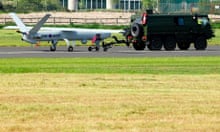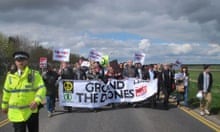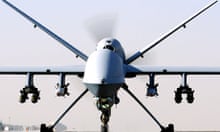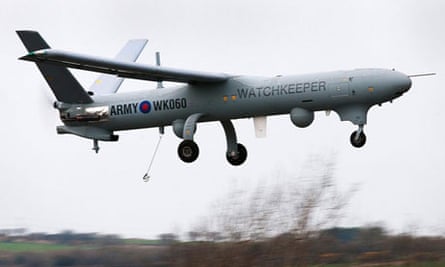
It is an odd little airfield, not far from Aberporth in west Wales, a former fishing village that now survives thanks to tourists with a taste for hill walking, windswept beaches and bracing swims in Cardigan Bay.
Few of the visitors venture to the former RAF base close by, and those that do are unlikely to know this small site, which was first established in the early years of the second world war, is pioneering some of the most controversial technologies in modern conflict.
The Ministry of Defence uses this privately owned airfield to test its "drones" – unmanned aerial vehicles (UAVs). It is the only airspace in Europe, one of a few in the world, where drones can be flown alongside normal manned aircraft, so its importance to the military, and for the future of British aviation, can hardly be overstated.
The MoD's newest and most sophisticated surveillance and targeting drone, the Watchkeeper, is undergoing trials at Aberporth. And on any given day, a host of other UAV manufacturers come to the base to fly their own models in zones called Delta 201 and Delta 202, which cover 2,000 sq miles over the sea, and 500 sq miles over land.
While the arguments over America's policy of "assassination by drone" rage across Pakistan and Afghanistan, fuelling public concern over the cold-eyed automation of warfare, the future of UAVs is quietly taking shape here on the Welsh coast, where there is daily proof that UAVs and manned aircraft can co-exist in British airspace.
Academics, senior members of the military and aviation experts may not agree on the ethical and moral dilemmas associated with UAVs, or how safe they are, but on one thing they are unanimous: the age of the UAV is upon us, and the uses for the aircraft are limitless. This truth means that whether people like it or not, the economics of UAVs will ultimately steamroller thecritics' concerns.
That is the belief of Ray Mann, 65, the owner of Aberporth airfield, who invited the Guardian to the base he has run for more than a decade to explain why he thinks the debate over UAVs has become slightly hysterical and somewhat illogical.
"Why should we be afraid of unmanned? It's as illogical as the fear of flying itself. We are not reinventing flying, we are simply organising a different form of control. The pilot has not gone walkabout, he is on the ground monitoring the situation in the same way as if he was in the air. He can operate the aircraft in exactly the same way, so it is no less safe than if he was in the cockpit. In some respects it is safer.
"At the moment, passenger aircraft can take off and land by autopilot, and during the flight, the plane flies itself. The pilot is pretty much redundant already."
The military was the first to appreciate this potential and invested heavily in the technology, but civilian operators are catching up fast.
"If anything, there is much greater potential in the civilian market," said Mann. "I am talking about cheaper ways of flying cargo, better ways of performing search-and-rescue operations, better ways of patrolling our borders. It will be a very long time before people accept passenger flights without a pilot on board, but the technology is already there. Someone will be the pioneer in this, spend the money and make the breakthrough, and I only hope a British company is involved, because we are on the verge of a new era."
The first UAV took off at Aberporth in 2004. Since then, Mann's team has overseen the flights of more than 1,000 UAVs at the base, including the military's Hermes 450, which has flown 80,000 hours on surveillance operations in Afghanistan, and Watchkeeper, the system which will replace it.
Watchkeeper has undertaken more than 260 test flights at Aberporth, supervised by a small team of MoD technicians who build and maintain the aircraft from a blue hangar surrounded by barbed wire. Not that the Watchkeeper needs much building or maintenance: it comes in a flatpack from a factory in Leicester and can be assembled in 16 minutes. "We are the only place in the UK where you can fly both manned and unmanned systems together at the same time," he said. "We have proved it can be done. The merging of airspace will happen, and it could happen within a few years."
Mann, who has been interested in flying since he became England under-14 pole-vaulting champion, is exasperated that the UAV debate has focused on the CIA's use of drones in Pakistan, where they have been used to target the Taliban and al-Qaida, not always accurately and not without civilian casualties. The issue there is the policy, not the platform, he argues.
Having invested £5m of his own money to turn Aberporth into a hub where drones and aircraft can fly together, Mann has a vested interest in the development of UAVs, but his estimation of the potential for the market is not overblown. The MoD told the Guardian it already had 500 UAVs, and the military intends a significant expansion of programmes over the coming decade.
"If technology continues to develop as expected, it may be possible to move towards a mix of around one-third remotely piloted platforms to two-thirds manned platforms by 2030," the MoD said. "[UAVs] provide a key capability in current operations and will continue to act as the basis for persistent surveillance capability in future conflicts."
The RAF has 10 armed "Reaper" drones flying in Afghanistan, bought from the Americans as part of an "urgent operational requirement". Though no decision has been taken about where the aircraft will go after the withdrawal in 2014, the MoD wants to make the Reaper part of its "core requirement", so it can keep the capability and increase its numbers. The RAF already has 34 qualified Reaper pilots, and another 16 are to be trained.
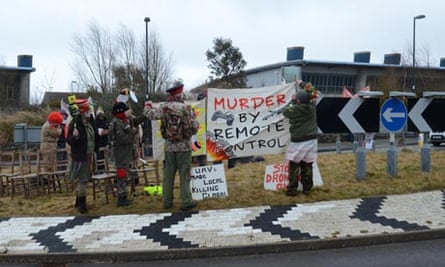
Two weeks ago the RAF announced its new UAV headquarters at RAF Waddington in Lincolnshire was controlling Reapers flying in Afghanistan – which coincided with a protest outside the base by campaigners. And these are just some of the developments within the RAF. Watchkeeper was bought for the army, which will have its own pilots to operate them.
Twenty-seven of the aircraft have been delivered by the manufacturer, Thales. The Royal Navy has started to tender for underwater drones that could be used in anti-submarine warfare and maritime surveillance.
The MoD said it was looking at ways of extending the number of sites within the UK where it could fly drones. A spokesman confirmed: "[We] remain engaged, through normal working relationships with the Department for Transport, Civil Aviation Authority and European organisations, in their efforts to open up more airspace to [UAVs]."
The expansion of the industry is gathering pace, but it is happening largely under the radar, and with little scrutiny or proper political debate.
This is a problem, according to Elizabeth Quintana, a senior research fellow at the Royal United Services Institute, who believes it is time the MoD, among others, stops shying away from the issue, and starts to make the case for unmanned systems in a more forceful and confident manner. All three main parties back the use of UAVs, and want to see the UK as a market leader in developing the technology.
Quintana said a recent poll for the thinktank appeared to show the public was "more relaxed about the use of UAVs than you might think".
"They are certainly more relaxed than people in America. I think over here, if people are presented with a choice between killing a known terrorist, or letting him get away, people think you should go ahead."
In a forthcoming paper, she will argue: "There continues to be much debate and fear over the use of armed remotely piloted air systems (RPAS) – or 'drones'. The principle arguments stem from a general sentiment that such remote warfare is unethical because the pilot is not putting him, or herself, in harm's way, and secondly that use of RPAS by the CIA to target terrorists is immoral and possibly even illegal.
"Any discussion of the UK's use of RPAS is immediately tarred with both brushes. Neither is appropriate, but the MoD, and indeed the government, needs to better articulate why [UAVs] are an essential part of the future force mix and the measures already in place to assure ethical use of force." She said the debate so far had not been properly informed. "The MoD should not be afraid to put forward its case.
"UAVs have the potential to be used for a variety of civilian and government applications. It would be regrettable if CIA operations in Pakistan hindered their adoption more broadly.'
Nick Miller, business director of Thales, one of the world's biggest defence companies, said the next step for UAVs was convincing the Civil Aviation Authority that "sense and avoid" technology was robust enough to allow UAVs and normal aircraft to coexist in British airspace. Miller believes the industry is very close to doing this, and that slowly but surely, UAVs will be integrated. They will also become more autonomous, but never fully autonomous. The public, he believes, will come to accept them. "If UAVs are saving lives in search-and-rescue operations, if they are protecting our borders, people are not going to have a problem with them. They are going to help."
Chris Cole, who set up and runs the Drone Wars UK website, is not convinced. He said lobbyists were bound to insist UAVs were safe. "Drone companies have a vested interest in telling the public they are being 'silly' to worry about UAVs flying over their heads, the reality is the technology is still unproven and safety must be paramount." For example, he said, a small UAV used recently for filming the new series of The X Factor span out of control and had to be crash landed in the Thames.
There are privacy issues too. "The UK is already one of the most surveyed societies with a reported 7m CCTV cameras watching us when we are in public," said Cole. "Drones will quickly bring that level of surveillance right into our homes and gardens. Some argue the privacy implications from drones are no different from helicopters. The reality is small drones with high-definition cameras and other sensors that can scoop up masses of data can be bought for just a few thousands of pounds rather than the millions that it currently costs to purchase and operate helicopters.
"Local councils, police and security agencies, private companies and even our next-door neighbours will soon be able to pilot small unmanned drones over our homes in the near future unless we put in place regulations now to protect our privacy and civil liberties."
The CAA has to grant permission if someone wants to use a small UAV for filming and, at the moment, rarely allows it in an urban environment. But it has no way of checking the material that has been gathered. It relies on trust, and the sanction that permission won't be granted again if the rules are flouted.
Mann said these are issues that can and must be addressed now, while the UK has a chance to become a world leader in the field. "We can put an aircraft up in the sky with a man in it. Now we can put an aircraft in the sky without a man in it. And it will be more effective and cost less. Of course there are concerns about not having a pilot, but they don't actually make a lot of sense.
"We have barely scratched the surface of the technology and its potential. We are still in the foothills. Every recession has a technology that helps to pull the economy back. UAVs could be the one this time, it's that big."
